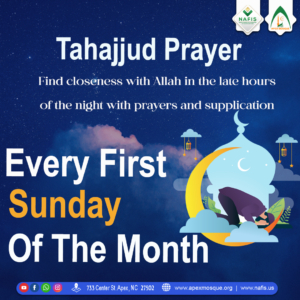Tahajjud/Qiyyam: The Path of the Righteous
Allah Most High said, “Establish worship at the going down of the sun until the dark of the night, and (the recital of) the Qur’an at dawn. Lo! (the recital of) the Qur’an at dawn is ever witnessed; and some part of the night awake for its recital, as voluntary worship for you. It may be that your Lord will raise you to a praised estate.” [Qur’an, 17: 78-79]
Abu Hurayra (Allah be pleased with him) reported that the Messenger of Allah (blessings and peace be upon him, his family, and companions) said, “The best prayer after the obligatory prayers is the night prayer.” [Muslim]
Abu Hurayra (Allah be pleased with him) also reported that the Messenger of Allah (blessings and peace be upon him, his family, and companions) was asked, “What prayer is most virtuous, after the obligatory prayers?” He said, “Prayer in the depths of the night.” [Muslim, Abu Dawud, Tirmidhi, Nasa’i, Ibn Majah]
Abd Allah ibn Salam (Allah be pleased with him) reported that the Messenger of Allah (blessings and peace be upon him, his family, and companions) said, “O people! Spread the salams, feed others, maintain family ties, and pray at night when others sleep and you will enter Heaven safely.” [Tirmidhi, Hakim]
Abu Umama al-Bahili (Allah be pleased with him) reported that the Messenger of Allah (blessings and peace be upon him, his family, and companions) said, “Hold fast to night prayer, for it was the way of the righteous before you, a way of drawing closer to your Lord, an expiation for wrong deeds, and a shield from sin.” [Tirmidhi, and others] In some narrations, there is an addition, “And it repels sickness from the body.”
Ibn Mas`ud (Allah be pleased with him) said, “The virtues of night prayer over day prayer is like the virtue of secret charity over open charity.” [Tabarani] The scholars explain that this refers to voluntary prayers.
It is disliked to leave the night vigil prayer for one who has made it their habit, unless there is an excuse, because the Prophet said to Ibn Umar (Allah be pleased with him), “O Abd Allah! Do not be like so-and-so. He used to pray at night and then left it.” [Bukhari and Muslim]. Therefore, one should take on an amount of works one can sustain, for the Messenger of Allah (blessings and peace be upon him, his family, and companions) said, “The most beloved of actions to Allah are the most constant, even if little.” [Bukhari and Muslim]
Qiyam al-layl or night vigil is a source of great spiritual energy. The Quran also commends the one who utilizes the early hours of each day to engage in remembrance of Allah: “Is one who worships devoutly during the hours of night prostrating himself or standing [in adoration] and who places his hope in the mercy of His Lord – [like one who does not]? Say: ‘Are those equal – those who know and those who do not know?’ It is those who are endowed with understanding that receive admonition.” [Az-Zumar 39:9]
The Prophet has said: “Keep up qiyam al-layl. It was the way of the virtuous who came before you, it draws you nearer to your Lord, atones for your sins, forbids you from evil and protects the body from sickness.” (Tirmidhi.)
Aishah (May Allah be pleased with her) reported: The Prophet (PBUH) kept standing (in prayer) so long that the skin of his feet would crack. I asked him: “Why do you do this, while you have been forgiven of your former and latter sins?” He said, “Should I not be a grateful slave of Allah?” [Al-Bukhari and Muslim].
Ali (May Allah be pleased with him) reported: The Prophet (PBUH) visited me and Fatimah (May Allah be pleased with her) one night and said, “Do you not observe prayer (at night)?”[Al-Bukhari and Muslim].
Salim bin `Abdullah bin `Umar bin Al-Khattab (May Allah be pleased with them) reported, on the authority of his father, that the Messenger of Allah (PBUH) said, “What an excellent man `Abdullah is! If only he could perform optional prayers at night.” Salim said that after this, (his father) `Abdullah slept very little at night.” [Al-Bukhari and Muslim].
So, join us every 2nd and 4th Sunday of the Month, one hour before Fajr prayer to experience the sweetness and power of this great act of worship. The Program includes:
- The prophetic Qiyyam (11 Raka’at, including withr),
- Duaa Al-Qunut
- Spiritual Talk
- Dihkr Session Until Sunrise
- Stretching
- Get-Together Breakfast


